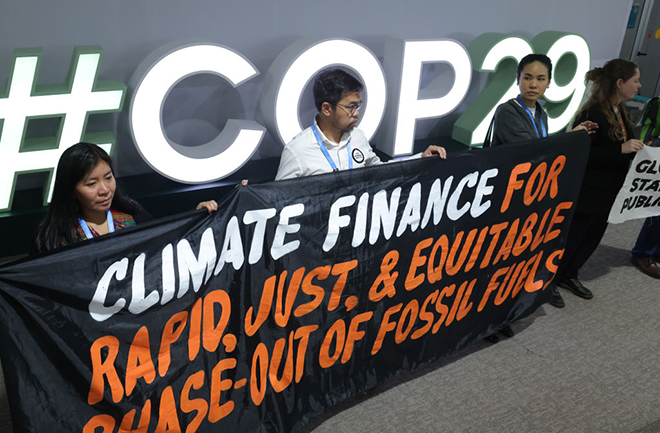
| Activists at the COP29 climate conference called for more financial help for the developing nations that are most vulnerable to the impacts of rising global temperatures. |
After two weeks of difficult negotiations at the United Nations Climate Change Conference in Baku, Azerbaijan, diplomats agreed to triple annual climate finance for vulnerable nations and to adopt critical rules for a first-ever global carbon trading market.
Reactions were mixed as COP29 came to a close in the early morning hours of Nov. 24. Leaders from developing nations said the promise by wealthy countries to increase annual funding from $100 billion to $300 billion by 2035 falls woefully short of the $1.3 trillion they sought to finance renewable energy sources and build resistance against extreme weather.
"This, in our opinion, will not address the enormity of the challenge we all face," India's delegate Chandni Raina told the conference moments after COP29 President Mukhtar Babayev struck his gavel to declare the summit's key objective met.
Others heralded the fact that an agreement to boost climate finance could be reached at all. At one point on Nov. 23, a group of negotiators from developing nations and island states vulnerable to sea level rise walked out of the talks in protest but later returned.
The final agreement calls on private-sector players and multilateral development banks like the World Bank to come up with the remaining $1 trillion.
"COP29 succeeded in delivering on its main objective: agreeing on a New Collective Quantified Goal on climate finance," Kaveh Guilanpour, vice president of international strategies for the US-based Center for Climate and Energy Solutions, said in a statement. "While many developing countries are clearly disappointed with this figure, and some rejected it after it was adopted, the fact that this outcome was achieved at all was not guaranteed, given the wider global geopolitics and political headwinds in developed countries."
In a White House statement, US President Joe Biden praised the outcome, saying the boosted finance will mobilize other sources of funding "while opening up new markets for American-made electric vehicles, batteries, and other products."
The US delivered more than $11 billion for climate-related projects in developing countries in fiscal 2024, preliminary figures released by the US State Department showed.
Throughout the COP29 conference, however, the election of Donald Trump as the next US president dampened expectations for US finance or other pledges. The US was not among nations that committed at COP29 to bar the construction of new unabated coal plants in their markets.
Trump has pledged to again withdraw the US from the Paris Agreement on climate change and to repeal the Biden administration's emission reduction policies.
Carbon market rules hit finish goal
A major breakthrough in Baku was the formal adoption of rules and guidelines underpinning international carbon trading under Article 6 of the Paris Agreement. Years in the making, the deal was seen by many as a turning point for carbon markets.
"We have unlocked one of the most complex and technical challenges in climate diplomacy," Yalchin Rafiyev, the COP29 presidency's lead negotiator, said in a Nov. 23 news release. "Article 6 is hard to understand, but its impacts will be clear in our everyday lives. It means coal plants decommissioned, wind farms built and forests planted. It means a new wave of investment in the developing world."
The United Nations-backed carbon market is expected to save nations billions in energy transition and climate program costs, while increasing the global demand for credits. Under the program, countries will be allowed to trade carbon credits from greenhouse gas reductions or removals to help other nations meet their climate goals.
Nations pledge, temperatures rise
The nearly 200 nations that signed onto the Paris Agreement must submit updated emission reduction pledges by February 2025. A few have already turned in their new plans, known as nationally determined contributions.
A recent UN report found that unless nations increase their efforts, the world will see global temperatures rise between 2.6 and 3.1 degrees C from pre-industrial levels this century. Such a change "would bring debilitating impacts to people, planet and economies," the report's authors warned.
Such warnings are going unheeded, national pledges notwithstanding, as the US and other major emitting nations continue to invest in fossil fuels. Concentrations of climate-warming emissions in the atmosphere reached a new record in 2023, scientists reported in October.
There is now a greater than 99% chance that 2024 will go down as the hottest year on record, Karin Gleason, monitoring section chief with the National Oceanic and Atmospheric Administration, told reporters at a Nov. 21 briefing.



